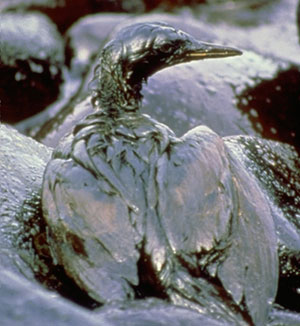
It's been two months since the BP Gulf oil disaster began. The spill has morphed from 'major', to the worst in U.S. history, and now to the worst environmental catastrophe the U.S. has ever faced. Lives have been lost, wildlife has died en masse, beaches and wetlands have been fouled, and livelihoods are threatened. Anger is thick as oil continues to pour into the Gulf of Mexico, despite BP's efforts to check the flow. Should we be concerned that such a spill could happen in Canada? Prime Minister Harper was quick to say 'no'.
Of course it could happen here. Big spills have happened in the past, despite apparently strong safeguards. U.S. regulations for oil drilling are not markedly different from Canadian ones. Do we honestly believe that American politicians said anything different when these major drilling projects were approved, after Exxon Valdez?
It could happen off the coast of Newfoundland, where the much greater depth (2.6 kilometres below the surface) of an offshore well planned by Chevron Canada would complicate containment efforts. The choppier waters and the presence of icebergs not only makes spills more likely -- they also slow the response to spills.
It could happen off the west coast of Canada, where Enbridge's proposed Northern Gateway project would mean twin pipelines from Alberta to Kitimat, B.C., and tankers to transport the oil over sea. Oil spills are one of the greatest risks facing globally-significant populations of seabirds and our iconic marine mammals of the Pacific, such as threatened sea otters and endangered killer whales.
It could happen in the Arctic, where cold temperatures and icy conditions complicate containment and mitigation efforts. There are plans to protect these sensitive and culturally significant ecosystems, including through marine protected areas (such as Tarium Niryutait), but current proposals would permit oil and gas activities. The same company responsible for the Gulf oil disaster has plans to drill in our Arctic waters -- and has repeatedly asked our government to relax safety regulations.
But it could happen anywhere.
Become aware of the global toll
If big oil spills are disasters when they happen here, they're also disasters when they happen elsewhere. Although Canada produces more oil than it consumes, it imports about a million barrels of oil per day from Algeria, Nigeria, Saudi Arabia, Iraq, and other countries. We benefit from the cheap prices on these imports that result from dangerous cost-cutting measures, so we are partly responsible for any spills that occur, even if we don't see the consequences.
And they do occur. In the past century, there have been more than 100 recorded oil spills on land and sea, about half of which have occurred in the past decade alone. Here are just three places where oil drilling mishaps have caused environmental devastation on a massive scale -- examples that never receive the level of reporting now focused on the Gulf catastrophe, but which qualify as catastrophic nonetheless.
In another Gulf of Mexico incident, the blowout of an oil well in the Bay of Campeche in 1979 released about double the amount of oil that's been gushing from the BP well -- and that's a conservative guess. As in BP's case, the blowout preventer had failed.
In 1991, an explosion caused a super-tanker to leak 260,000 tonnes of oil off the coast of Angola -- almost as much as BP's ruptured well, and about seven times the volume spilled by the Exxon Valdez in Alaska.
In the Niger Delta, spills on land from leaky pipes and burning gas flares continue to be a daily occurrence, causing acid rain and contaminating wetlands. Over the past 50 years, almost two million tonnes of oil have spilled into the sensitive wetlands and mangroves.
We must make corporations pay the real costs
As in other places, these spills are just the physical manifestation of the oil exploration in the region, which have also left legacies of corruption, violence, and bloodshed. The problem -- in the Gulf, Angola, Nigeria, and other places around the world -- is that oil companies don't pay the full costs of exploration and development of this public resource. When a big spill happens, birds, turtles, otters, and fish die by the hundreds and thousands, and food webs and ecological processes are disrupted for years. All this exacts large tolls on the people nearby who swim, fish, hunt, or simply enjoy watching animals or seeing healthy ecosystems. Oil companies rarely if ever bear these costs.
As a nation, Canada can ensure the highest practicable standards of oil production, and it can push for the same from exporting nations. The federal government can also ensure that the full costs of production are borne by those who profit, perhaps through strictly enforced regulations, higher accountability for safety standards, and taxation. Such policies would inherently stimulate development of clean energy alternatives, which would position Canada to realize sustained economic growth through competitive advantage in a post-fossil-fuel world.
When we hear about a major oil spill we can and should re-assess our own oil drilling and transportation practices, at home and abroad. An environmental disaster shouldn't have to be close to home before it registers on our moral barometers. ![]()
Read more: Energy, Rights + Justice, Politics, Environment














Tyee Commenting Guidelines
Comments that violate guidelines risk being deleted, and violations may result in a temporary or permanent user ban. Maintain the spirit of good conversation to stay in the discussion.
*Please note The Tyee is not a forum for spreading misinformation about COVID-19, denying its existence or minimizing its risk to public health.
Do:
Do not: